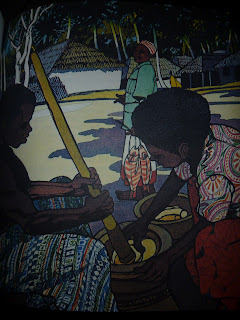Chinua Achebe wrote Things Fall Apart to try to bring a new understanding to African colonialism and how it transformed the lives of those who had lived there at the time. His main character is someone who epitomizes the highest ideals of the traditional ways and believes in his culture whole-heartedly. Okonkwo is always ready to go to the fullest extent to support and defend his people's traditions and way of life. But the story is much more complicated. As the Christians arrive as set up their missions, the children of this same cultural heritage, and indeed, of Okonkwo himself, convert, and start to see the world in a new way. Achebe wrote the book to help contextualize the changes the people underwent. When two cultures meet, both are changed forever. Achebe grew up in a period after this, in a world where these two cultures had already collided. He was educated in English, and read writing about Africa that either painted it's pre-colonial peoples as savages or as nobles. Through this book, he sought to present them as people. People, who just like any other people lived, loved, and died. He also hesitates to paint Christian missionaries as either saviors or condemners of those people. He instead seeks to show what happened, and how the interactions and evolutions were very human, and provide a feeling for what the people were like before, and how these interactions influences and changed them, and the culture forever.
An excellent short film discussing this book and it's significance can be viewed here.
| Kola nuts (photo from http://www.goodlife.com.ng), the staple of the kola nut ceremony to welcome guests. |
| Global Literacy Project |
I don't want to spoil the end of the book for anyone reading this who has not read the book, but I found it to be tragic, and necessary to the story. This book is a lesson about people, about humanity, ambition, colonialism, and cultural centrism. There is so much that can be learned about this book, not only about the Ibo, but about all people. We can take away from this much about how we view ourselves and other cultures, and about who we are and how acculturation affects our views of the world.
One of my favorite things about reading texts like this one is the detail about the daily lives of people in another culture. It is wonderful to be taken on that journey and to learn about the daily lives of other people. For me the most interesting aspects of this are not only the religious and cultural beliefs, but also the costume and cuisine of a a group. One of the foods that is mentioned over and over again in the book, and is not included in the glossary is a dish called foo-foo. Something that I really like to do is to immerse myself in a culture in as many ways as possible while I am studying it. For this reason I pulled out an African cookbook that I had in hopes of finding a recipe for foo-foo to both satisfy my curiosity and my palette. I found one, and though I have yet to try making it, I look forward to doing so soon!
 |
| Making Fufu, by Alain Le Foll from the Black Africa Cookbook |
(Americanized version of West African cassava Fufu)
Peel and boil 8 white potatoes until tender. Drain, mash and add 1/2 tablespoon of rice flour (can be bought in Oriental markets) per potato. Sift flour in, beating all the time with a wooden spoon. Continue to beat until mixture is smooth. Serve in a mound in a warm dish.
Yam or Sweet Potato Fufu can be made the same way, except it is better to steam, not boil, these vegetables until tender. Let them cool slightly before mashing and beating.
Bayley, Monica. Black Africa Cook Book. 1977. Determined Productions Inc. Print.
Note: I have also been studying some of the African myths that are included in the book, and have been reading them with my children. I am still waiting on a copy of one from the local library, so I will post about those in a subsequent blog. :)

No comments:
Post a Comment